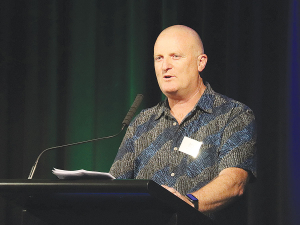Changing skill demands and new job opportunities in the primary sector have prompted Massey University to create a new degree course and add a significant major into another in 2025.
The deputy head of the School of Agriculture and the Environment, Professor Danny Donaghy, says the new degree course is the Bachelor of Earth and Environmental Science which replaces two degrees that have been run at Massey - one on earth science and the other on environmental science.
He says making a single degree creates more synergy between the two areas. Donaghy says the new degree is aimed at giving graduates the skills they need in dealing with managing resources at a catchment level and includes a focus on geo science, climate change and natural hazards. He says Massey University has a lot of expertise in this area and says the degree is very relevant to developing environmental regulations and supplying hard data to support NZ's claims around the provenance of its primary exports.
The other change is to incorporate a horticultural management major within the existing Bachelor of Agribusiness.
"This is responding to industry demand for more work ready graduates and to focus on the business and management aspect of the horticultural industries.
"It's really targeting careers in consultancy and management within the hort industry," says Donaghy.
He says the new major is also based on the feedback of agribusiness students who want to work in horticulture and keep asking if they need to do a hort degree to do this. The new major will address those issues, he says.
Read More
"Both these changes are responding to national priorities and about training the next generation of consultants and managers," he says.
Wrong Idea About Hort
Professor Danny Donaghy says Massey is having an ongoing problem trying to convince potential students, their parents and other advisors that a career in horticulture is about having a highly paid exciting job dealing with technology and innovation and not just about picking fruit.
He says one of the big misconceptions they have to counter is when the media runs stories that NZ can't get enough pickers from the Pacific or Southeast Asia.
"So, parents have sort of got it in their heads that if you do a hort degree you'll just end up picking fruit. But as well as fruit pickers the industry is crying out for people to manage factories, packhouses and to develop new export markets. They don't realise the vast array of exciting jobs the sector offers," he says.
Donaghy says changing these misconceptions is very hard and says we have to remember that NZ is a very urbanised society which has little connection to what happens beyond city limits. He says a lot of people aren't connected to where their food comes from. They have little idea of how chickens are raised, how cows are milked and vegetables grown.
He says this disconnect has an impact on attracting young people to make a career in the primary sector. Danny Donaghy says it was interesting to note at the recent prizegiving for the top agricultural students - many were from cities. He says once they know about the career opportunities in the primary sector they are hooked. "What we need in this country is some gentle education of more people to connect them up with where their food comes from," he says.


















